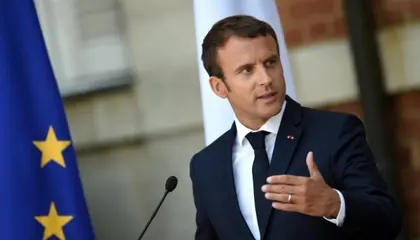French President Emmanuel Macron triggered a shockwave in Europe on Tuesday by refusing to rule out the dispatch of Western ground troops to Ukraine in its fight against the Russian invasion.
Macron had hosted a conference of European leaders on Monday -- just over two years to the day after Russia invaded Ukraine -- seeking to rally greater support for Kyiv, which faces increasing battlefield challenges and dwindling munition stocks.
JOIN US ON TELEGRAM
Follow our coverage of the war on the @Kyivpost_official.
He painted a grim picture of Russia under President Vladimir Putin, arguing there had been a "change of posture" even in the last months that had seen a hardening of its stance both domestically and in Ukraine.
"Nothing can be excluded to pursue our objective: Russia cannot and must not win this war," Macron said after the conference gathering leaders including German Chancellor Olaf Scholz and Polish President Andrzej Duda that ended with a midnight press conference.
While there was "no consensus" on the sending of Western ground troops to Ukraine, "nothing should be excluded. We will do whatever it takes to ensure that Russia cannot win this war," Macron added.
Kremlin spokesman Dmitry Peskov offered a muted initial reaction on Tuesday, saying that sending Western troops to Ukraine was "absolutely not in the interests of these countries, they should be aware of this."
- 'Can't rule out anything' -

Possible Rapprochement Between US and China Will Embarrass Moscow | Bohdan Nahaylo
Macron had refused to say more about France's position, citing the need for "strategic ambiguity" but saying the issue was mentioned "among the options".
"We are convinced that the defeat of Russia is indispensable to security and stability in Europe," Macron said.
Slovak Prime Minister Robert Fico, accused by critics of being too cosy with Moscow, said after the meeting that there was disunity on the issue at the meeting.
"There are countries that are ready to send their own soldiers to Ukraine, there are countries that say never –- Slovakia is among them -- and there are countries that say that this proposal should be considered," he said.
Prime Minister Ulf Kristersson of Sweden, which is set to join NATO, poured initial cold water on the idea, saying "it's not on the cards at all for the moment".
"For the moment, we're busy sending advanced (military) equipment to Ukraine," Kristersson said.
Macron was criticised at home by the party leader of the far-right National Rally Jordan Bardella who accused the president of "losing his cool" by raising "the spectre of a committing of our troops against a nuclear power".
But French Prime Minister Gabriel Attal Tuesday reaffirmed Macron's comments, saying "you can't rule anything out in a war".
Macron even took an apparent swipe at France's ally Germany, which had been mocked in the first months of the war for its relatively soft promises of military support.
"I recall that two years ago many around this table said we will offer sleeping bags and helmets and now they say we need to do more and quicker to have missiles and tanks."
"Let us have the humility to note that we have often been six to twelve months late."
- 'Against us all' -
Macron argued that the hardening of Russia's approach had been "cruelly" manifested in the death in an Arctic prison on February 16 of President Putin's top opponent Alexei Navalny.
"There is in our eyes a change of posture on the part of Russia," Macron said.
"Russia is adopting an attitude that is more aggressive not just in Ukraine but against us all in general."
Macron said a new coalition would be set up to supply Ukraine with "missiles and bombs of medium and long range to carry out deep strikes".
There was a "broad consensus to do more and quicker", he added, saying there was also a consensus to ramp up joint production of armaments with Ukraine and boost its own military industry.
Czech Premier Petr Fiala meanwhile said there was "great support" for an initiative to help Ukraine buy munitions outside the EU. Dutch Prime Minister Mark Rutte said his country would contribute and others would follow.
Ukrainian President Volodymyr Zelensky complained Ukraine only received 30 percent of a million shells the EU had promised.
"It is clear that we did not have this million," Macron responded, acknowledging an "imprudent commitment".
There are growing doubts about the viability of long-term US backing for Ukraine as a new aid package struggles to find legislative approval and Donald Trump, who has indicated opposition to further support for Kyiv, eyes a return to the presidency in elections this year.
But Macron insisted Europe should not wait for the result of the elections, where Trump is expected to face off against incumbent President Joe Biden.
"It's our future, Europe's future that is at stake, we must have the possibility to do without (the United States), not out of defiance, pessimism or fear but because it depends on us," said Macron.
You can also highlight the text and press Ctrl + Enter










